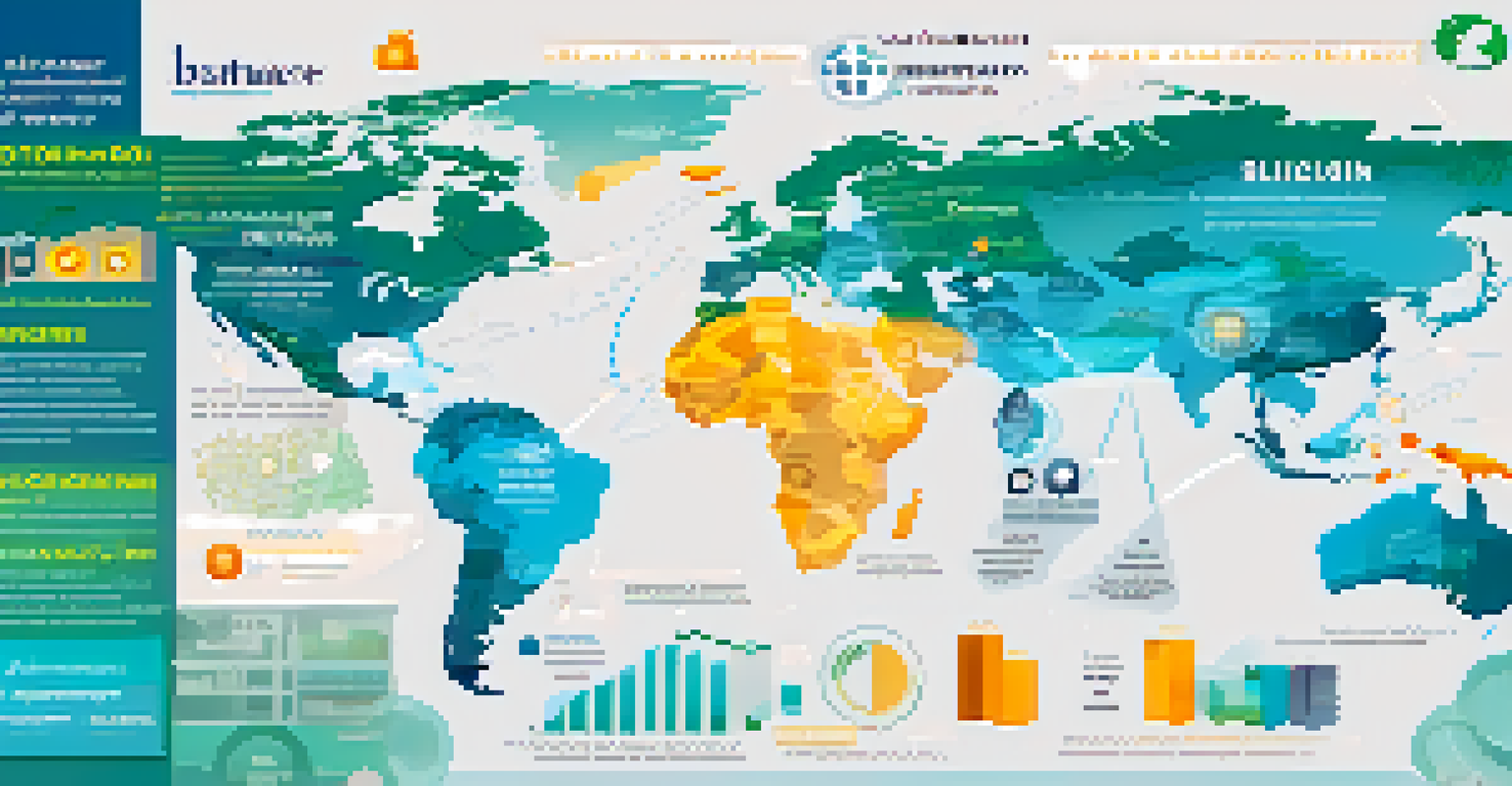Bitcoin's Influence on Remittances in Developing Countries

Understanding Remittances and Their Importance
Remittances are funds sent by individuals working abroad to their families in their home countries. For many developing nations, these remittances play a crucial role in supporting local economies, helping families cover essential expenses like food, education, and healthcare. In fact, remittances can account for a significant portion of a country's GDP, making them a vital source of income.
Remittances are a lifeline for families in developing countries, providing essential support that can change lives.
However, traditional remittance channels often come with high fees and lengthy transfer times, which can be a burden for both senders and recipients. This is where Bitcoin comes into play, offering an alternative that could potentially reduce costs and expedite transactions. By understanding remittances, we can appreciate why any changes in this landscape are crucial for millions.
Furthermore, the reliance on remittances underscores the challenges many developing nations face economically. With Bitcoin, there’s an opportunity not just for savings but also for financial empowerment, allowing individuals to take control of their own financial futures.
How Bitcoin Works in the Remittance Space
At its core, Bitcoin is a decentralized digital currency that operates on a technology called blockchain. This means that transactions can happen directly between individuals without the need for intermediaries like banks. For remittances, this direct transfer can significantly reduce transaction fees, which are often a major pain point in traditional systems.

When someone sends Bitcoin across borders, it can be converted into local currency at the destination, often at a much lower cost than traditional remittance services. This process not only speeds up the transaction but also keeps more money in the hands of families who rely on these funds for their day-to-day needs.
Remittances Fuel Developing Economies
Funds sent by workers abroad are crucial for supporting families and local economies in developing nations.
For many, the idea of using cryptocurrency might seem daunting, but it's becoming increasingly accessible. With the rise of user-friendly wallets and exchanges, sending Bitcoin is now more streamlined than ever, making it a viable option for remittances.
Benefits of Bitcoin for Cross-Border Transactions
One of the most significant advantages of using Bitcoin for remittances is the reduction in fees. Traditional services can charge upwards of 7-10% of the total amount sent, while Bitcoin transactions typically incur much lower fees, often less than 1%. This means more money reaches the intended recipient, making a real difference in their lives.
Bitcoin is a technological revolution that has the potential to empower individuals and communities around the world.
In addition to lower fees, Bitcoin transactions can often be completed in a matter of minutes, compared to the days it can take with traditional methods. This speed is especially crucial for families who need immediate support, whether it’s for medical emergencies or other urgent financial needs.
Moreover, Bitcoin provides a level of security that can be appealing to users. Transactions are recorded on the blockchain, making them transparent and immutable. This can help reduce fraud and increase trust in the system, which is essential for individuals who may be wary of using traditional financial institutions.
Challenges and Concerns with Bitcoin Remittances
Despite its benefits, the use of Bitcoin for remittances is not without challenges. One of the primary concerns is the volatility of Bitcoin's price; fluctuations can result in the sender or receiver losing value in the transaction. This uncertainty can make families hesitant to adopt this new form of currency.
Additionally, not everyone in developing nations has access to the technology required to use Bitcoin effectively. Internet access and smartphone ownership are still limited in many areas, which can restrict the ability of individuals to participate in this new financial system.
Bitcoin Reduces Remittance Costs
Using Bitcoin for remittances significantly lowers transaction fees and speeds up transfers compared to traditional methods.
Lastly, regulatory issues and legal frameworks around cryptocurrency vary widely from country to country. In some regions, Bitcoin is welcomed, while in others, it may be restricted or even banned. This inconsistency can create confusion and hinder the adoption of Bitcoin for remittances.
Real-World Examples of Bitcoin Remittance Success
In recent years, several companies have emerged to facilitate Bitcoin remittances, showcasing its potential. For instance, platforms like BitPesa (now known as AZA Finance) have made waves in Africa by allowing users to send Bitcoin to local currencies, thus improving the remittance process for many. Their success illustrates how Bitcoin can be harnessed to provide more efficient financial services.
Another notable example comes from the Philippines, where Bitcoin has been used to send remittances between the U.S. and the archipelago. In a country where remittances are a lifeline for many families, the integration of Bitcoin has opened new doors for affordable and speedy transactions.
These real-world applications demonstrate that Bitcoin is not just a theoretical concept; it is actively changing lives and reshaping the way remittances are handled in developing countries.
The Role of Education in Bitcoin Adoption
As with any new technology, education plays a crucial role in the adoption of Bitcoin for remittances. Many potential users may be unfamiliar with how Bitcoin works or may have misconceptions about its safety and reliability. Providing educational resources can help demystify the process and empower individuals to make informed decisions.
Workshops, online tutorials, and community programs can all serve as valuable tools to spread awareness and knowledge about Bitcoin. By addressing common concerns and explaining the benefits, these initiatives can help build trust and encourage more families to consider Bitcoin as a viable remittance option.
Education Boosts Bitcoin Adoption
Providing education about Bitcoin can help alleviate misconceptions and encourage more families to use it for remittances.
Furthermore, local partnerships with trusted organizations can enhance credibility and further promote Bitcoin's use. When individuals see community leaders and trusted entities advocating for Bitcoin, it can lead to greater acceptance and willingness to try this new method of sending money.
The Future of Bitcoin in Remittance Markets
Looking ahead, the future of Bitcoin in remittance markets appears promising. As more people become aware of its benefits and as technology continues to advance, we may see increased adoption among individuals and businesses alike. This shift could lead to a more inclusive financial landscape, especially for those in developing countries.
Additionally, as regulatory frameworks evolve, we may witness more supportive environments for cryptocurrency use. Governments recognizing the potential of Bitcoin could create policies that encourage its adoption, paving the way for a more stable and reliable remittance system.

Ultimately, Bitcoin's influence on remittances could transform the financial lives of millions, providing them with better access to funds and a more equitable financial system. With continued education and innovation, Bitcoin has the potential to make remittances not only cheaper and faster but also more accessible to those who need it most.